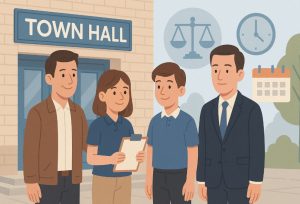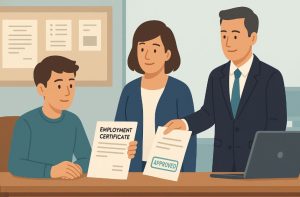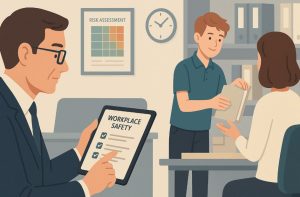Table of Contents
In the UK, many 14-year-olds are eager to gain their first work experience, earn some pocket money, and build responsibility.
But getting a job at this age comes with clear legal limitations and protections. While teens can work part-time from age 14, there are specific rules that govern the types of jobs, working hours, and permissions required.
In this detailed guide, we’ll answer the key questions around youth employment laws in the UK and help both teenagers and parents understand the best ways to navigate job opportunities in 2025.
What Are the Legal Requirements for a 14 Year Old to Work in the UK?

Under UK law, the minimum age to work part-time is generally 13, but 14 is the age when many teenagers begin their first job search in earnest. That said, there are strict national laws and local council-specific rules in place to regulate child employment.
Minimum age
You must be at least 13 years old to work part time in England, Scotland, and Wales (some councils may not permit work until age 14).
Full-time education
You must still be in school. Full-time work is not permitted until after the last Friday in June of the school year you turn 16.
Type of work
Only “light work” is permitted, meaning jobs that are not likely to harm a child’s safety, health, or development, or interfere with education.
Work certificate
Most local councils require a child to have an employment permit before they can start a job. This is issued by the education department of the local authority.
Failure to comply with these rules can result in penalties for the employer, and potentially end the child’s employment.
What Types of Jobs Can a 14 Year Old Do?
When it comes to employment for 14-year-olds, the UK law only allows non-hazardous, supervised, and age-appropriate roles. The aim is to protect young workers from environments that could pose risks to their physical or emotional well-being.
Permitted jobs include
| Permitted Jobs (Light Work) | Notes / Conditions |
| Delivering newspapers and leaflets | Allowed if not during school hours and within permitted work times |
| Babysitting for friends and neighbours | Considered informal work; best when arranged with family acquaintances |
| Dog walking or pet sitting | Should be done locally and under trusted adult oversight |
| Helping out in shops or retail stores | Allowed with adult supervision; no cash handling in most cases |
| Waiting tables in cafes | Permitted only if away from kitchens and hot equipment |
| Assisting in hair salons | Tasks like sweeping floors or booking appointments; no handling of chemicals |
| Gardening under supervision | Limited to light tasks—no machinery or use of sharp tools |
These roles are classified as “light work,” suitable for young teens, and are typically limited to duties that are low-risk and easy to supervise.
Jobs NOT permitted include
| Prohibited Jobs | Reason It’s Not Allowed |
| Working in factories or on construction sites | Hazardous environment and industrial equipment banned for under-16s |
| Selling or serving alcohol | Illegal under age 16, even with adult supervision |
| Operating dangerous machinery or equipment | Poses serious physical risk to minors |
| Working in commercial kitchens | Exposure to hot surfaces, sharp tools, and slippery conditions |
| Door-to-door sales | Considered unsafe and unsuitable for children |
| Employment in adult entertainment venues or betting shops | Entirely restricted due to nature of the workplace |
Each local authority in the UK may have a slightly different list of permitted or prohibited jobs, so always check directly with the child employment officer of your local council.
How Many Hours Can a 14 Year Old Work Per Week?
In the UK, the number of hours a 14-year-old can work is heavily restricted to ensure their studies and health are prioritised.
School Term Time Rules
| Day | Maximum Working Hours |
| School Days | 2 hours (before OR after school, not both) |
| Saturdays | 5 hours |
| Sundays | 2 hours |
| Weekly Limit | 12 hours total |
School Holiday Rules
| Day | Maximum Working Hours |
| Weekdays | 5 hours per day |
| Saturdays | 5 hours |
| Sundays | 2 hours |
| Weekly Limit | 25 hours total |
Other legal conditions
- No work before 7:00 am or after 7:00 pm
- 1 hour break required if working more than 4 hours at a time
- At least 2 consecutive weeks off work during school holidays
These protections are designed to avoid exploitation and ensure the child has sufficient rest and time for education.
Do 14 Year Olds Need a Work Permit or Employment Certificate?

Yes, most local authorities in the UK require a work permit (employment certificate) for any child under 16 who is taking on a job. This must be arranged through the employer and approved by the local council.
Steps to get a work permit
- The employer applies to the local council for a permit.
- The council may require proof of school attendance and health.
- A parent or guardian typically needs to give written consent.
- Once approved, the permit confirms the child is allowed to work legally.
Without this permit, the employment is considered illegal even if the job itself is legal and light.
What Role Do Parents and Guardians Play in Teen Employment?
Although 14-year-olds may be enthusiastic about earning money and gaining independence, parents and guardians play a vital role in ensuring their job is suitable, legal, and safe.
Parental responsibilities include
- Helping assess the safety and appropriateness of job offers
- Ensuring working hours don’t interfere with school or rest
- Communicating with the employer to verify conditions
- Applying for or overseeing the work permit process
Parental involvement is also important for helping teens build confidence and understand workplace expectations, like punctuality, professionalism, and communication.
Where Can a 14 Year Old Find Part-Time Job Opportunities?
At 14, most jobs aren’t listed on traditional recruitment websites. Instead, opportunities are often found through local networking, community noticeboards, or word of mouth.
Common sources of jobs
- Local shops or corner stores
- Family friends or relatives needing help
- Charity shops or church organisations
- Pet care or dog-walking services
- Babysitting for neighbours
- Noticeboards in schools, youth clubs, or libraries
It’s wise to look for jobs that are within walking distance, involve minimal risk, and don’t compromise school or family time.
What Should Employers Know About Hiring a 14 Year Old?

Employing a 14-year-old is legal in the UK only if the correct procedures are followed. Employers have a duty to ensure the child’s welfare and compliance with labour laws.
- Apply for a work permit from the local authority
- Conduct a risk assessment to ensure the job is safe
- Ensure work does not interfere with schooling
- Adhere to the legal working hours and conditions
- Maintain clear communication with parents/guardians
Employers who violate these regulations can face fines or prosecution, and may be banned from employing children in the future.
How Can Teens Balance Work and School Effectively?
Balancing schoolwork with a part-time job helps build maturity and discipline. However, if poorly managed, it can negatively impact education and wellbeing.
Tips for maintaining balance
- Create a weekly planner to manage study, chores, and job shifts
- Avoid working on nights before big exams or assignments
- Communicate with your employer about school commitments
- Prioritise rest, especially during term time
- Schedule work mainly on weekends or holidays
A well-structured routine will help teens gain the benefits of work without sacrificing academic success.
Is Working at 14 Beneficial for Personal Development?
Definitely. When done legally and responsibly, early employment offers long-term benefits.
Builds Self-Confidence and Independence
Working helps teenagers feel more capable and responsible, boosting their confidence as they step into adult environments and make decisions on their own.
Develops Time Management and Teamwork Skills
Balancing school and work teaches them how to manage their time efficiently and work with others skills that are essential throughout life.
Introduces Financial Literacy (Budgeting, Saving)
Earning money helps teens understand the value of saving and spending wisely, encouraging smart financial habits from an early age.
Encourages Responsibility and Accountability
A part-time job shows young people the importance of being reliable, punctual, and following through on commitments.
Adds Valuable Experience to Future CVs or Applications
Even small jobs show initiative and work ethic, helping 14-year-olds stand out in future job, school, or apprenticeship applications.
Lays the Foundation for Career Exploration
Early jobs allow teens to explore different interests, which can guide future education and career choices.
What Are the Common Myths About Teen Employment?

Let’s debunk a few misconceptions that many parents and teens hold about youth employment in the UK:
| Myth | Reality |
| You must be 16 to work | You can start part-time work at 13 or 14 with limitations |
| Any job is fine if parents approve | Jobs must follow national law and council regulations |
| You can work full-time in summer | You’re still limited to 25 hours per week |
| Babysitting doesn’t count as work | It does if you’re regularly paid and accountable |
| Employers handle permits automatically | Employers must apply for work permits—it’s not automatic |
Understanding the facts ensures young workers stay protected and informed.
What Should a 14 Year Old Include in Their First CV or Job Application?
Even without much experience, a 14-year-old can make a compelling CV that highlights their enthusiasm, reliability, and eagerness to learn.
Basic CV structure for teens
- Personal Details: Name, age, contact info (with parent/guardian permission)
- Short Introduction: A few lines about what makes you a responsible and motivated young worker
- Education: Current school, subjects, grades
- Experience: Volunteering, clubs, or helping at home
- Skills: Timekeeping, communication, creativity, organisation
- References: A teacher, neighbour, or family friend
Many employers value attitude and reliability more than experience in young applicants.
Conclusion
So, can a 14 year old get a job in the UK? Absolutely but only under the right legal and practical conditions.
With proper guidance, part-time work at this age can be a positive and valuable experience, teaching essential life skills such as time management, responsibility, and financial awareness.
However, it’s crucial that both employers and families follow the rules set out by UK employment law and local councils.
From understanding permitted job types to applying for a work permit, every step must be taken with care to ensure the child’s safety and education remain the top priority.
Whether it’s delivering newspapers, assisting in a local shop, or walking neighbourhood dogs, the right job can provide a safe, enriching start to a teenager’s working life.
If you’re a parent, employer, or teenager considering this step, always consult your local authority first and remember that the goal is not just to earn money, but to learn and grow responsibly.
FAQs About 14 Year Olds Getting a Job in the UK
Can a 14 year old work in a shop in the UK?
Yes, they can assist in shops with tasks like shelf-stacking, tidying, or customer service, provided it’s considered light work and they have a work permit.
Is a 14-year-old allowed to work after school every day?
No. They can only work 2 hours maximum on school days, and not before 7 am or after 7 pm.
What jobs are best for a 14-year-old in the UK?
Babysitting, newspaper delivery, helping in shops or salons, dog walking, and café service are popular and legal choices.
Does a 14-year-old need insurance to work?
No, but the employer must have public liability insurance covering all staff, including underage workers.
Can a 14-year-old earn the minimum wage?
No. The UK minimum wage does not apply to workers under 16. Pay is at the employer’s discretion but must still be fair.
Who checks if a 14-year-old is working legally?
The local authority’s education welfare officer is responsible for monitoring legal compliance in child employment.
Can a 14-year-old work on a farm in the UK?
Only if the tasks are light, safe, and the work is permitted by the council—with proper supervision and a permit.

